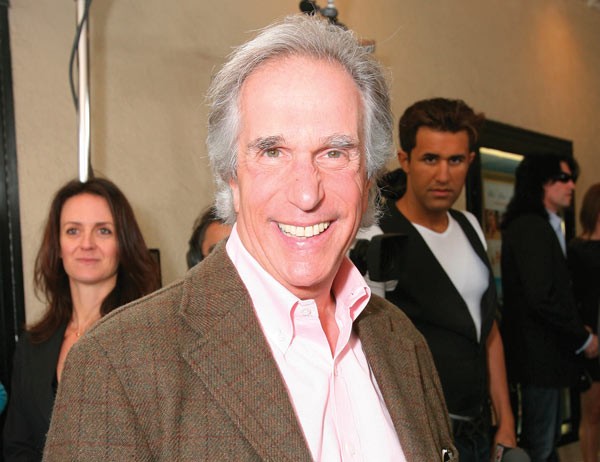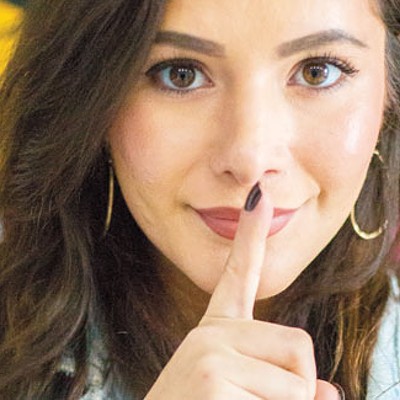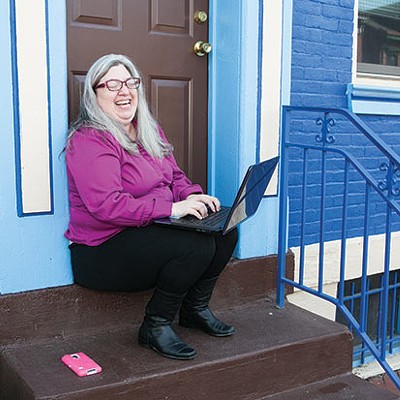There is no denying that it's hard to separate Henry Winkler from his most famous character — Arthur "The Fonz" Fonzarelli on Happy Days. But throughout a career that has spanned more than 40 years, the 69-year-old entertainer has dozens of film and television credits — that include the lead role in a television adaptation of A Christmas Carol, a stint on Arrested Development, supporting roles in four Adam Sandler films and a comeback in Scream — and has also worked as a director and producer, including the 1990s hit show MacGyver. In addition to acting, Winkler and his writing partner Lin Oliver have penned 19 children's novels featuring Hank Zipzer: The World's Greatest Underachiever. The semiautobiographical tales are inspired by Winkler's own life-long struggles with dyslexia. The actor, who will appear this weekend at the Steel City Con at the Monroeville Expo Center, took some time to chat with City Paper about The Fonz, his books, and his favorite Pittsburgh food. (Sorry, Primanti's; it's not you this time.)
I know that you've been to Pittsburgh. Do you have any stories, memories or impressions of the city that you'd like to share?
I came to Pittsburgh the first time 20 years ago and a friend of mine, an ex-Pittsburgher, said the minute you get off the plane, you go to The Big O. So ever since then, I've always gone. Lidia's is another place I go for a serious meal.
You're well known for starring alongside Pittsburgh native Michael Keaton in his first film role, Night Shift. He's back in the spotlight again and getting Oscar buzz for Birdman; what are your memories of him and that film?
You know what? He deserves it. There are a handful of performances out there this year that are spectacular and Birdman is right in there. Michael created an incredible character to watch. Now, on Night Shift, Ron Howard came to me and said, "You can play either part." And I said, "I've already played The Fonz and that seems like Billy Blaze. This time, I'll play Richie. [Winkler played the mild-mannered good guy, Chuck, in Night Shift.] So Ron asks me to help him cast the other part. So, I sat with him in every audition and read with every actor who came in. And I'm talking about Kurt Russell, listen, every young actor in Hollywood came by to say hello. And one of the last guys we saw — at this time Ron is a little distraught because every guy we saw was good, but not exactly what he was looking for — was Michael Keaton. He was a kind of unknown standup comedian, full of energy and within 15 to 30 seconds, Ron looked at me, nodded his head and Michael had gotten himself the part. He owned it. And working with him was a most wonderful time. There's a scene on the subway where a guy comes up and plays a saxophone right in my face. Over lunch I said, "You know, there's got to be something I can do ... I don't just want to give him a dollar." Without hesitation Michael Keaton says to me, "Write him a check," and so I did and it was great. That was the microcosm of the way we worked.
Your character in that film was such a departure from your characters on Happy Days and The Lords of Flatbush. Did you set out during that time and after Happy Days to only play different types of characters?
That's an interesting question because in the beginning I was petrified about being typecast and I did everything that I could to beat the system. You can't beat the system. People said at that time, "He's such a good actor, I love Henry, he played The Fonz." In Scream, I almost didn't get to be in the movie. The director offered me the role of the principal and the executives of the production company said, "Well, that will throw the balance of the movie off because everyone will see The Fonz." So they let me be in the movie but they said, "We're not going to put you in the credits, and we're not going to put your name on the one-sheet." I agreed and I did the movie and had a wonderful time with Wes [Craven]. So then they screened the film for the public so they could take notes and do research. When my character came on the screen, I got applause. Now all of a sudden, the same production company is asking me to come and do press for the film. And of course despite all of that, I did because it's the right thing to do. But that story is an example of what I was up against, what I'm still sometimes up against. What I learned is, something comes along and you just do it because you just don't know what's going to stick. That's one of the three main lessons I talk about when I talk to children about my children's book series — you don't know until you try.
So what's your take-away from those experiences?
That experience ... doesn't allow you to say, "Oh, I'm too big for that." I am so grateful for all of the stuff I get to do because there were 10 years there that I remember only too well when I couldn't get any parts and I started to produce and direct.
Looking back on those 10 years, do you regret not acting?
No. Although, I'm an honest guy so I have to tell you, I was sad that I just couldn't get an acting role. But then at some point my career just turned the corner. Now, I speak publicly, my partner and I have done 19 novels, and right now I am part of four television shows including Arrested Development, Royal Pains, and yesterday I shot the final episode of Parks and Recreation. My children's novels, Hank Zipzer: The World's Greatest Underachiever, I couldn't sell them in America. I did a tour in Great Britain and I kept talking about them and talking about them and I got a publisher and we just completed shooting the second season of Hank Zipzer for the BBC. And that's the second major lesson I talk to children about: tenacity. Tenacity gets you where you want to go and gratitude doesn't allow you to be angry along the way.
You've had that attitude since the beginning haven't you? I found a 1977 Merv Griffin interview where you said, "Life is full of risks...You have to go all out. You can't live in the middle." And that seems to be the same message you have now.
It's true, and here's the thing, it does pay you back. If you've prepared yourself and you take yourself and just dive in, we as human beings are equipped to figure it out. It's all about conquering that fear that you won't be able to.
Is that what got you through life as someone who has struggled with dyslexia but still managed to have not only an acting career, but an MFA from Yale? I mean, how were you able to do that?
Honest to God, that came from will. I wanted to do what I've done. I didn't know some of the parts of it, I mean, I never thought for one second that I would be part of a team that wrote this many novels for kids, let alone be on the New York Times best-sellers list. But I wanted to continue and not sit at home and wait for my phone to ring. Will, I'm telling you, is like a tank that can push through brick.
Is that your message when you talk to children?
I'm so convinced that children come to the world full-blown. And if you're quiet, you will see who they will be or who they need to be. That's the other thing that I talk a lot about: The idea that we teach children what we think they should learn instead of looking at how they learn. I took geometry, the same course, for four years. And nobody, since 1963, has ever said the word hypotenuse to me. What the hell were they thinking?
At what point did you decide to write the "Hank Zipzer" books to get the message out about dyslexia and learning challenges?
There was a lull in my acting career. I had a manager for 30 days before the company he worked for imploded. During that time, he said, "I think you should write a children's book about your dyslexia, for kids." And I told him he was crazy. My heart sunk because I always thought I was stupid. You know, a kid will buy in to what they hear. He said it to me at the beginning of our tenure together and again at the end. I was smart enough to say, "You know what? I'm going to try." He introduced me to Linn Oliver, and I never thought that what's happening in my life now — touring all over the world, speaking to children — would come from what I thought was just filling time during a lull in my acting career. And now, ba-boom.
Are the books completely autobiographical?
They are, although the humor is exaggerated, but the emotion is real. I walk around Linn's office and we're writing about something emotional — the frustration about not being able to figure something out or the feeling that you have to cover your shame — and it all just comes pouring out of me like a volcano as if at that moment, I am 8 again. And the reality of that is, you write the truth and the kids look at it and think, "How did you know me so well?" I bring the books to the comicons and now the new books for second-graders, brand new readers, are printed in a font — we're the first ones to do this in this country — that was developed by a dad in Holland for his kids who have learning challenges and when you look at the print, you can see it's so much easier to track the words.
As someone with dyslexia, what was it like for you before that first writing session?
I'm sitting in my car, and it takes about 20 minutes to get to her office from my house, and I'm panicked. And as you know, we've now written all of these novels and I sometimes still drive to her office in that same panic wondering, "What am I going to say?" But we schmooze and talk about our lives and then I walk around her office, she sits at the computer and we talk and work. At the end of the day, she prints out what we've done that day and there are six to eight pages that didn't exist before. I'm telling you, it never gets old. I am over-fucking-whelmed every time. It's like I tell these kids, you don't know the greatness that lies within you until you try.
You talk about lulls in your career, but if you look it over, it seems like you've worked continually in this business since the 1970s.
In different way I have, it's true. But I decided long ago that I wasn't going to wait for people to call me, I just kept doing other things. And then I came back and I'm having this wonderful time as an actor and a writer. I go to these comicons and you meet people who you'd never meet otherwise in your life, the emotion that these adults bring — oh my gosh.
You enjoy going to these events?
Absolutely. Listen, it's a great way to earn a living — you sell a book or a picture for a Christmas gift — but to stand there and meet people ... Grown men have hugged me and told me how great it is to meet me. The one sentence that I get and that I love from people is, "Thanks for the laughs." They tell me stories like maybe the only time they bonded with their father or grandmother was sitting on the couch and watching Happy Days. These days too, it's generational. There's a generation for Happy Days, a generation for Scream, a generation for The Waterboy and you can see where that person is in their lives. I go there and I stand in front of the table and I meet people and look them in the eye and talk to them. It's like I've said before, if you're going to do it, you'd better just dive in.
Have you ever been asked to sign something just a little too personal?
Sometimes, especially early on, I have been asked to sign body parts that I probably didn't sign. I say, "Look, I'm flattered by the offer, but please keep your shirt on and perhaps I can interest you in a book."
Happy Days had a life of its own at the height of its popularity. There are kids now 20 years after the show ended who still watch and love this show. But was there a time that you realized it had hit iconic status?
I am in shock at the popularity even today of that show. I can't deny it. It's amazing. Who comes and talks to me? It is the sanitation engineer who is emptying the trash cans on Fifth Avenue, and it's the woman who just walked out of the building and lives on Fifth Avenue. Everyone loves that show, and I don't take that lightly.
Do you have a good relationship with The Fonz now?
Can I tell you how loyal he is? He reads "Hank Zipzer" and he gives me notes.



















